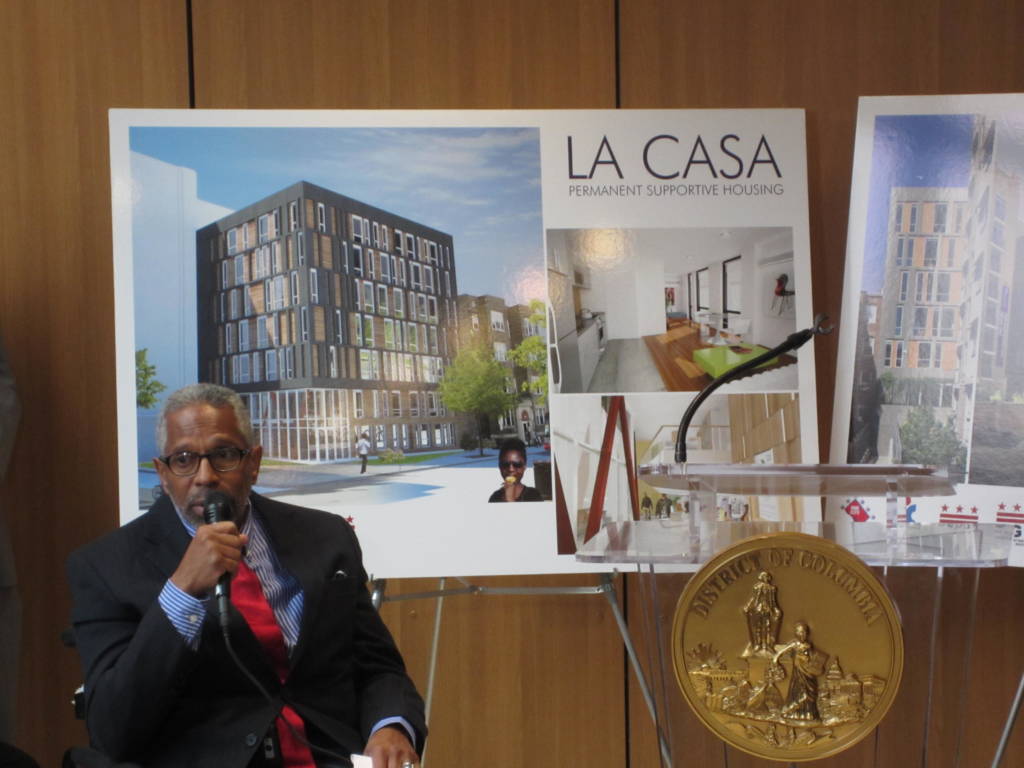Half a block from the Columbia Heights metro station, across from IHOP, Best Buy, and other restaurants and retail establishments, sits the District’s first seven-story homeless facility.
A December 11 ribbon-cutting ceremony marked the opening of La Casa Permanent Supportive Housing (PSH) program. The 40-unit building, which also contains a community room, will serve chronically homeless men, particularly veterans and members of the Latino community.
The building has gold certification for leadership in energy and environmental design from the Green Energy Council and meets all requirements for accessibility set forth in the American Disabilities Act (ADA). Each floor features commissioned paintings by Howard University students and staff. Its modern design is right at home next to other high-rises in the area.
According to the Department of General Services, “The District wants to break the notion that homeless care facilities are institutional, generic unpleasant places to be… La Casa…will change the perception of the public and the perception of the residents.”
From 1985 through 2010, La Casa existed as a humble building and several trailers that provided 90 emergency shelter beds and 40 transitional beds to the homeless community.
The Columbia Heights Metro station opened in 1999. In 2002, the parcel of land La Casa sits on came under scrutiny by Donatelli Development, Inc., when the city designated land near the Metro station as part of a redevelopment plan that would include the reincarnation of La Casa. Donatelli has since constructed condominiums, apartments, and retail in the form of Highland Park and Kenyon Square.
“When I found La Casa, the trailers were ratty and unclean; there was a terrible hypothermia death. It was in a terrible state, in a gang controlled neighborhood. Poor quality, poor area, poor results,” Jim Graham, four term city council member for Ward 1, described to the audience at the ribbon-cutting ceremony. “But it did a lot of good work too. I’ve met people along the way whose lives were saved!”
Just under four years ago, La Casa was an empty lot. While the promise of new and improved facilities was well received, the question of what would happen to shelter residents while the land was refurbished hung in the air for five years. Residents made several suggestions regarding what the new facilities should include: job training, basic toiletries, better food, and more permanent housing.
[Read more: Filling a void left in Columbia Heights, breaking ground on the new La Casa]
All 40 units at the new La Casa are single room occupancy (SRO) spaces, where residents do not have to pack up and leave each morning. “People doubted La Casa would ever come back. Now everyone is calling me: ‘Jim, can I get in there, can I have a key,’” Graham chuckled.
Many services make up the District’s Continuum of Care for the homeless, including prevention services such as rental assistance, emergency nightly shelter, and several types of housing. Transitional housing offers support such as case management and treatment for mental health or addiction, but with the inherent goal of transitioning, these programs generally come with a time limit of six to nine months.
La Casa’s original transitional housing program, managed by D.C. Coalition for the Homeless, moved to 1131 Spring Road, NW and continues to operate as La Casa Transitional Rehabilitation Program.
Compared to transitional housing, Permanent Supportive Housing (PSH) offers more comprehensive services. The United States Interagency Council on Homelessness reports that multiple studies show this method is more cost-effective than allowing someone to remain homeless.
In the PSH single room occupancies, tenants sign a lease, rather than seeking to comply with varying programmatic requirements. Advocates say it normalizes the arrangement. The Community Partnership, which manages D.C.’s continuum of care, selected Friendship Place through a competitive RFP process to manage the new La Casa.
“We know that the solution to chronic homelessness is housing, and specifically a Housing First approach to Permanent Supportive Housing,” Jill Carmichael, Division Director of Friendship Place, said as part of the Way Home Campaign.
New resident Denver Hawkins also spoke at the ribbon cutting. Hawkins has been homeless for some time, and a prime candidate for placement in PSH – but most PSH units are not ADA accessible. For Hawkins, who uses a wheelchair, that means he needed to keep looking.
Amber Harding, a staff attorney with the Washington Legal Clinic for the Homeless who has worked with the District’s PSH program since its inception, calls ADA access it’s own “continuum of problems.”
There are varying levels of access: “full,” “usable,” and “no-stair” for people that can generally walk around, but cannot handle stairs. Fully accessible locations have sinks with no cabinets under them to make space for wheelchairs, appliances and clothing racks that are closer to the ground, etc. Most ADA compliant units are usable – with ramp access, elevator or lift if necessary, and some “grab bars.”
The city’s “scattered site” program means that most PSH recipients find a private landlord that will accept their voucher. Harding has seen other “beautifully designed” ADA accessible PSH buildings in the city, but they are few and far between.
“We should surely incentivize development of this fashion,” Harding declared.
Hawkins, who stayed in the original La Casa shelter, is just happy to have been placed somewhere.
“There’s so much to be said – I didn’t start here looking like this … moving in, I’m able to take a shower and clean up. I just got a haircut yesterday,” Hawkins said, wearing a suit and tie for the event. “It’s no kind of life [out there]: sleeping in hotel lobbies till they tell you to leave, people avoiding you because of the smell…”
La Casa’s assistant director describes the new facility as doing just that – defining community and providing the homeless population with dignity and respect.
“You need to clean the streets up,” Hawkins said, “there needs to be more places like this built: for females, for people in wheelchairs, for amputees.”








